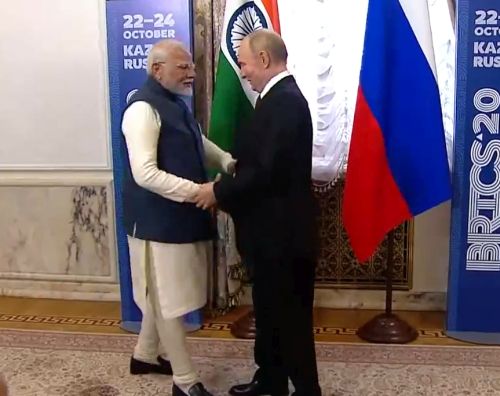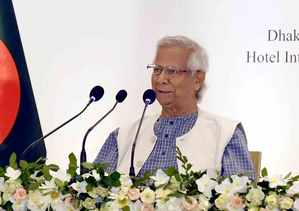International
US official: Talks in Doha on hostage-ceasefire deal were most 'constructive' in months
Washington, Aug 17 (IANS) The past two days of negotiations in Doha for a ceasefire-hostage deal between Israel and Hamas were the most constructive that mediators had seen in months, a senior Biden administration official told reporters.
The official said on Friday that US President Joe Biden spoke with Egyptian President Abdel-Fattah el-Sisi and Qatari Emir Tamim bin Hamad Al Thani, with all three leaders agreeing that “now is the end game” and discussing the “final bridging proposal” put forward by the US in the Qatari capital, The Times of Israel reported.
All three mediating countries believe the final bridging proposal submitted on Friday by the US closes just about all remaining gaps between the parties, the official added.
“We will be reconvening in Cairo at this level before the end of next week, with an aim to close out this process once and for all,” the official added during the phone briefing.
Biden later released a statement, saying the proposal “offers the basis for coming to a final agreement on a ceasefire and hostage release deal,” adding that his calls with the Qatari and Egyptian leaders were “to review the significant progress” in the negotiations.
“Our teams will remain on the ground to continue technical work over the coming days, and senior officials will convene again in Cairo before the end of the week. They will report to me regularly,” he added.
US President Joe Biden also noted Secretary of State Antony Blinken’s scheduled visit to Israel on Sunday, saying he was dispatching his top diplomat “to reaffirm my iron-clad support for Israel’s security, continue our intensive efforts to conclude this agreement and to underscore that with the comprehensive ceasefire and hostage release deal now in sight, no one in the region should take actions to undermine this process”.
The statement did not name Iran, but came as Iranian leaders have been threatening to attack Israel for the recent assassination of Hamas Chief Ismail Haniyeh in Tehran, which Israel has neither confirmed or denied carrying out.
Asked if Iran will continue to hold off on retaliating against Israel now that the Gaza ceasefire-hostage talks have been extended, Iran’s mission to the UN in New York, says: “We hope so.”
Iranian Foreign Minister Ali Bagheri meanwhile said he was updated by his Qatari counterpart Mohammed bin Abdulrahman al-Thani about negotiations in Doha.
In a statement posted to X, Bagheri said he told al-Thani that Israel can’t be trusted, while calling “to use all means” to force an end to Israel’s offensive in Gaza against Hamas.
A statement from the Qatari Foreign Ministry said the two “stressed the need for calm and de-escalation in the region” and that al-Thani “reiterated Qatar’s commitment to supporting all regional and international efforts aimed at achieving regional and international security and stability”.
In addition to Iran’s threatened retaliation, its Lebanese proxy Hezbollah has pledged to attack Israel for killing the terror group’s top military commander Fuad Shukr in Beirut last month after a Hezbollah missile killed 12 children in the Golan Heights, raising fears that the cross-border skirmishes could escalate into a full-scale war.
Speaking with reporters about the last two days of talks, the US official said the Israeli team dispatched to Doha was “clearly empowered,” in an apparent nod to Prime Minister Benjamin Netanyahu, who has been accused of not giving his negotiators enough leeway to secure a deal.
The past two days of negotiations in Doha for a ceasefire-hostage deal between Israel and Hamas were the most constructive that mediators had seen in months, a senior Biden administration official told reporters on Friday.
Speaking with reporters about the last two days of talks, the US official said the Israeli team dispatched to Doha was “clearly empowered,” in an apparent nod to Prime Minister Benjamin Netanyahu, who has been accused of not giving his negotiators enough leeway to secure a deal.
While Hamas did not participate in-person in the Thursday and Friday meetings, its representatives are already in Doha and were able to engage with Qatari and Egyptian mediators over the past two days, the official said.
This proposal is based on the one Israel submitted on May 27, which served as the framework for the speech Biden gave on May 31 that revealed key elements of the Israeli offer.
The official dismissed a series of statements made by Hamas officials both on record and anonymously in which they expressed disapproval of how the hostage talks went in Doha over the last two days.
“I know there’s a lot of public statements from Hamas right now. I wouldn’t take anything too seriously,” he said, adding that Hamas is under significant pressure to reach an agreement given the severity of the humanitarian situation in Gaza.
“Should Hamas say no, think about what they’re doing to the people of Gaza.”
According to the official, Hamas on July 3 submitted its own response to the Israeli proposal, which included some unacceptable amendments and others that were the basis for further discussion.
On July 27, Israel issued a paper with a series of “clarifications,” the official continued, notably echoing Netanyahu’s description of the document. Other Qatari, Egyptian and Israeli negotiators have described the text as a series of new demands that significantly hampered efforts to reach a deal.
These included a demand for Israel to remain indefinitely in the Philadelphi Corridor between Egypt and Gaza and the establishment of a new mechanism to prevent armed Palestinians from travelling from southern to northern Gaza.
Regarding the Philadelphi Corridor, the official was ambiguous, only saying that “that issue is moving in the right way, and I think is very consistent with the May 27 text”.
Regarding the second sticking point, the official said the deal stipulates that only displaced and unarmed civilians will be allowed to travel from the southern part of the enclave to the northern part.
“We believe, as do the other mediators… that if anyone is carrying arms from south to north, that would be a violation of the deal,” the official asserted. “That is something that was reaffirmed throughout the talks.”
Netanyahu began insisting last month that a mechanism is being established to ensure that no armed Palestinians reach northern Gaza. The official, however, did not mention such a mechanism.
“What we’ve done is taken the gaps that remain and bridged them in a way that a deal is now ready to close,” the official said.
The official clarified that there is still more work to do and that working groups from the sides will be convening in the coming days to talk about issues, such as the list of hostages and prisoners being released and the sequencing of those releases. Much of the last two days was spent discussing these issues known as the “keys”.
The working groups will also discuss the establishment of an “implementation cell” for the deal that will determine how the hostage-prisoner exchange will be carried out and how it will be monitored to ensure compliance.
The cell will also discuss the implementation of the humanitarian aspects of the deal, including the surge of aid into Gaza, the clearing of rubble, and rehabilitation of service.
“The bottom line after two days in Doha (is that) we wanted to get this process back on track. We very much have done that. The consensus of all the participants here over the last 48 hours is that there’s a new spirit here to drive this to a conclusion,” the official added.
Referencing some of the Palestinian security prisoners who Israel will have to release as part of this deal, the senior US official acknowledged that some aspects of it are “heart-wrenching”.
However, he stressed that the primary reason to move forward with the deal is to save the lives of the hostages in Gaza. “If you continue to negotiate for months and months and try to get a perfect deal… you risk having no hostages left to save.”
The official clarified that the hostage release deal would be conducted in a way that “ensures Israel’s security interests”.
The war broke out on October 7 when Hamas terrorists infiltrated Israel, killing some 1,200 people, mostly civilians, and kidnapping 251. It is believed that 111 hostages remain in Gaza, including the bodies of 39 confirmed dead by the IDF.
Hamas released 105 civilians during a weeklong truce in late November, and four hostages were released before that. Seven hostages have been rescued by troops alive, and the bodies of 24 hostages have also been recovered, including three abductees mistakenly killed by the military as they tried to escape their captors.
Hamas is also holding two Israeli civilians who entered the Gaza Strip in 2014 and 2015, as well as the bodies of two IDF soldiers who were killed in 2014.
The Hamas-run Gaza Health Ministry says more than 40,000 people in the Strip have been killed or are presumed dead in the fighting so far, though the toll cannot be verified and does not differentiate between civilians and fighters.
Israel said it has killed some 17,000 combatants in battle as of August, and another 1,000 terrorists inside Israel on October 7.
Israel said it seeks to minimise civilian casualties and notes that Hamas fights from homes, hospitals, mosques and schools.
Israel’s toll in the ground offensive against Hamas in Gaza and in military operations along the border with the Strip stands at 332.
–IANS
khz/
International
Lee Hsien Yang seeks refuge in United Kingdom

Lee Hsien Yang, the youngest son of Singapore’s founding father, the late Lee Kuan Yew, announced on Tuesday that he is now a political refugee in the United Kingdom after seeking asylum from the British government “as a last resort.”
“I remain a Singapore citizen and hope that someday it will be safe to return home,” Lee stated in a Facebook post, as reported by Channel News Asia (CNA).
Citing what he described as the Singapore government’s “attacks” against him, Lee, who is the younger brother of former Prime Minister Lee Hsien Loong, revealed that he sought asylum protection in 2022.
Lee Hsien Yang and his late sister, Lee Wei Ling, who passed away earlier this month, have been in conflict with their brother Lee Hsien Loong over the fate of their father’s home following his death in 2015, resulting in a public dispute that has estranged the siblings.
In an interview with the UK-based newspaper The Guardian, Lee alleged that a “campaign of persecution” compelled him to seek asylum in Britain.
In response to his claims, the Singapore government stated that there is “no basis” for his allegations of “a campaign of persecution” or other assertions regarding political repression in the country.
“Singapore’s judiciary is impartial and makes decisions independently. This is why Singaporeans have a high level of trust in the judiciary,” a government spokesperson remarked.
The spokesperson added that there are no legal restrictions preventing Lee and his wife, lawyer Lee Suet Fern, from returning to Singapore. “They are and have always been free to return to Singapore,” the spokesperson said.
Lee and his wife have been outside of Singapore since 2022, having opted not to attend a scheduled police interview regarding potential offenses related to providing false evidence in judicial proceedings concerning their father’s will and the family home.
Lee and his late sister, who had been living at the property, alleged they felt threatened while trying to fulfill their father’s wish to demolish the house. They also accused their elder brother, former Prime Minister Lee Hsien Loong, of abusing his governmental influence to advance his personal agenda.
International
Indo-Russian ties are stronger than ever before at BRICS

Kazan, Russia: Prime Minister Narendra Modi held a bilateral meeting with Russian President Vladimir Putin on the sidelines of the 16th BRICS Summit.
During the meeting, President Putin remarked, “I recall our meeting in July, where we had productive discussions on various issues. We’ve also spoken over the phone several times. I am very grateful you accepted the invitation to come to Kazan. Today, we will attend the BRICS Summit’s opening ceremony, followed by dinner.”
PM Modi responded by expressing his appreciation, saying, “I sincerely thank you for your friendship, warm welcome, and hospitality. It’s a great pleasure to visit such a beautiful city as Kazan for the BRICS Summit. India shares deep historical ties with this city, and the opening of our new embassy here will further strengthen these connections.”
International
Laos seeks to enhance nutrition amid climate change concerns

Vientiane (Laos), Aug 22 (IANS) Representatives from the Lao government and development partners have attended a conference here titled “Climate Change and Nutrition in Laos: Intersections and Interventions” to discuss the impact of climate change on nutrition in the Southeast Asia country and potential solutions.
Speaking at the conference, deputy director general of the Department of Hygiene and Health Promotion under the Lao Ministry of Health Viengkhan Phixay, said, “We gather to address a critical and interwoven issue: the impact of climate change on nutrition and how we can work together to tackle these challenges,” Xinhua news agency reported.
The Lao government is actively engaged in this endeavor, with numerous policies and initiatives aimed at addressing both climate change and nutrition, Lao National Television reported on Thursday.
“By leveraging the Scaling Up Nutrition network in Laos, which is led by the government, and supported by civil society, donors, and the United Nations, we have a robust platform to tackle the negative impacts of climate change while improving nutrition and overall health for everyone in Laos,” Viengkham said at the conference held on Monday.
The conference featured a series of presentations that not only detailed evidence-based research but also introduced innovative tools for measuring and enhancing nutrition under the impact of climate change.
The conference stressed the critical need for integrated approaches to tackle the intertwined challenges of climate change and nutrition, and setting the stage for impactful future collaborations.
–IANS
int/psd
International
One killed, seven injured in shootout in Iraq

Baghdad, Aug 22 (IANS) A civilian was killed while seven others were injured on Thursday in a tribal shootout in Iraq’s holy Shiite province of Najaf, according to a local security source.
The shootout erupted in the early hours between armed men from the local tribe in the al-Zarga area in northern Najaf, some 160 km south of Baghdad, a local police officer told Xinhua on condition of anonymity.
The clash resulted in the killing of an Iraqi civilian and the injury of seven others, including three Iranian Shiite pilgrims, the source added.
A joint force from the Interior Ministry’s emergency response division and Najaf provincial police arrested 53 gunmen from both sides of the shootout and seized weapons and ammunition, the Interior Ministry said in a statement.
It added that search operations are ongoing to locate additional gunmen and weapons, with more details to be released later.
The incident took place as numerous pilgrims traveled to the city of Karbala to observe Arbaeen, which marks the end of a 40-day mourning period for the killing of Imam Hussein, the grandson of Prophet Muhammad, in the Battle of Karbala in 680 A.D.
Typically, these pilgrims also visit Najaf as part of their journey to Karbala.
–IANS
int/jk/arm
International
Bangladesh seeks $1 billion budget support from World Bank

Dhaka, Aug 22 (IANS) Bangladesh’s interim government has sought $1 billion from the World Bank as budgetary support.
The call came from the country’s Power, Energy and Mineral Resources Adviser Muhammad Fouzul Kabir Khan’s meeting with Abdoulaye Seck, the World Bank’s Country Director for Bangladesh and Bhutan, in Dhaka on Wednesday.
He made the plea as the ministry owes more than 2 billion dollars to suppliers in import costs of power and energy, Xinhua news agency reported.
Khan mentioned that the interim government, which was formed with many pressing mandates, is due to settle a $2 billion debt left by the previous government in the power sector.
He said they have already suspended activities under the much-criticized Quick Enhancement of Electricity and Energy Supply Act 2010 and abolished the government’s power to set energy prices without any public hearing.
On August 5, the former Prime Minister of Bangladesh, Sheikh Hasina, was ousted from her country and power, ending her rule since January 2009.
This event was seen as a massive escalation, with what initially started as student’s protests and resulted in a major crisis in Bangladesh.
Earlier on August 8, Nobel laureate Muhammad Yunus took oath as the head of Bangladesh’s interim government.
–IANS
int/jk/as
-
Video2 years ago
PM Modi Attacks Congress in Karnataka with “Kerala Story”
-
Politics2 years ago
Siddaramaiah & DK Shivakumar sworn in as Chief Minister & Deputy CM respectively
-
Cricket2 years ago
CSK players rejoice 5th IPL title with their families (Pics)
-
Entertainment2 years ago
Karan Deol weds his longtime Girlfriend Drisha Acharya (Pics)
-
Sports7 years ago
History Of Official FIFA WORLD CUP Match balls
-
India2 years ago
Ashwini Vaishnaw: Railway Board recommends CBI probe in the Odisha railway disaster
-
Entertainment2 years ago
Urvashi Rautela dazzles on Cannes 2023 red carpet (Pics)
-
Entertainment2 years ago
Sunny Leone gets ready for Kennedy premiere in Cannes (Pics)





























